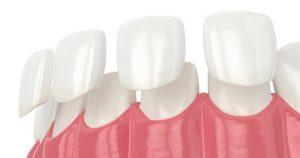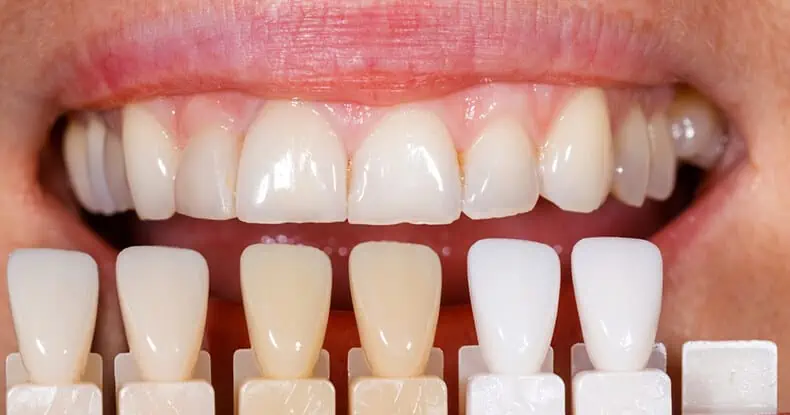If you’re considering porcelain veneers because your teeth are chipped, crooked, or discoloured, then you’re probably wondering how much they cost. They may seem expensive, especially if you’re on a budget, but cowith veneers, you really get what you pay for.
And while porcelain veneers cost more than other types of dental veneers, they are often preferred in terms of durability, longevity and aesthetics.
This article will discuss everything you need to know about porcelain veneers and help you decide if they are the right option for you, including:

- What are the different types of dental veneers?
- Porcelain veneers pros and cons
- How much do porcelain veneers cost?
- Can you get them on the NHS?
- Do veneers ruin your teeth?
- Porcelain veneers procedure
Drinking coffee, smoking, or consuming strongly pigmented food or drink, like red wine or coffee, can stain your teeth. In addition, the acid from these foods and drinks can even damage the enamel permanently.
Chipped or cracked teeth or gaps between the teeth can also be problematic. Though these problems might seem minor at first, they can worsen over time and lead to more significant issues. Treatments like porcelain dental veneers are a relatively low-invasive treatment that can improve your smile within 2-3 appointments.
Let’s take a closer look at dental veneers.
In This Article
- 1 What are dental veneers?
- 2 What are the different types of veneers?
- 3 Porcelain veneer procedure
- 4 Do veneers ruin your teeth?
- 5 How much do porcelain veneers cost in the UK?
- 6 Are porcelain veneers worth the cost?
- 7 Can you get porcelain veneers on the NHS?
- 8 Why are porcelain veneers expensive?
- 9 Where can I get porcelain veneers near me?
- 10 Conclusion
- 11 FAQs
What are dental veneers?
Dental veneers can help to improve your smile and treat a range of minor aesthetic concerns from discolouration to gaps or misalignment. They are wafer-thin shells made of porcelain or composite resin designed to cover the front surface of teeth and improve their appearance.
In the following video, Dr Mark Hughes, a top cosmetic dentist explain what dental veneers are, and how much they cost.
What are the different types of veneers?
Over the years, experts in cosmetic dentistry have made many advances in the types of material used to design dental veneers in terms of durability and longevity. Porcelain dental veneers have been used by dentists for decades now, but they are quite expensive.
Let’s take a look at all different the options, so you can make an informed decision on the type of veneer you would like.

Traditional porcelain veneers
Porcelain veneers are the most popular type on the market. This is because they look the closest to real teeth because porcelain can mimic the light-reflecting property of natural teeth better than any type of veneer available. One type of porcelain veneer that you may have heard of is Cerec veneers.
Cerec veneers use 3D software to redesign your smile and are becoming increasingly popular because they can often give same-day results.
Porcelain laminate veneers are known for being the most biocompatible and will rarely cause any damage or irritation to the surrounding gum tissue. However, they do require the natural teeth to be shaved down before they are attached.
Emax veneers
Emax veneers, also known as Emax laminate veneers are another type of porcelain veneers that are made from lithium disilicate glass-ceramic. They are wafer-thin, which require less tooth to be shaved off and are much stronger than traditional porcelain veneers.
When it comes to Emax veneers vs porcelain veneers, Emax veneers are more translucent making them a better match to natural teeth. And they are even more durable than traditional porcelain ones, but more expensive as well.
Minimal-preparation veneers
If you have fewer cosmetic concerns, your dentist may go with minimal preparation veneers like Lumineers. They are thinner than traditional veneers and don’t require extensive enamel removal. So if you want to take a more conservative treatment approach, minimal-prep veneers may be the solution you are looking for.
Composite veneers

The 2 primary types of veneers are composite and porcelain. Composite veneers are made with composite resin, which is the same material used for tooth-coloured fillings.
They are specifically designed for dental issues like cracks, discolouration, and chipped teeth, and are more cost-effective compared to porcelain.
Composite dental bonding is a similar cosmetic procedure used to cover imperfections in teeth. They provide pretty impressive results in just one dental visit. Your dentist will match the resin to the colour of your teeth and apply it in layers.
Composite veneers vs porcelain veneers
More often than not, your dentist will suggest either porcelain or composite veneers because these are widely considered to be the best veneer options for most patients. Here’s a breakdown of some of the differences between the two.
Porcelain veneers are more durable than composite and are less prone to staining. They can be attached without removing any of the tooth enamel, and are less likely to break or chip.
Composite veneers are very similar to porcelain, but they are a lot less durable, and not as natural-looking.
Porcelain Veneers | Composite Veneers | |
Practice Visits | Multiple | Usually just 1 |
Longevity | 10 - 15 years | Up to 5 years |
Aesthetics |
|
|
Cost per tooth | £450 to £850 | £100 to £400 |
Damage to existing teeth | Filing & enamel removal required except for Lumineers | Possible filing & enamel removal |
Porcelain veneer procedure
As we have already discussed, there are different types of dental veneers. Some types don’t require much enamel, but the traditional porcelain veneer process is as follows:
- An initial consultation with your dentist to discuss your treatment and access your teeth to see if veneers are right for you (this may include x-rays).
- The dentist may then take initial impressions of your mouth and teeth.
- Your next appointment will be to prepare your teeth, this includes shaving of the enamel and then making impressions to send to the dental lab.
- It will take the lab 2-4 weeks to create the veneers, in the meantime you will get temporary veneers.
- When your veneers are ready your dentist will check the colour and fit, and make adjustments.
- The veneers are bonded to your teeth with a special dental cement that requires a light shone on it to activate the chemicals in the cement and harden it quickly.
- You will most likely have another appointment to check the veneers placement, and make sure there is no irritation or damage to your gums.

Do veneers ruin your teeth?
Dental veneers shouldn’t damage your teeth, as they are meant to be permanent. But in most cases you will have to have your teeth shaved down to accommodate the veneers. Whether you have chipped, broken, or misshapen teeth, veneers can help you get the smile you’ve always desired.
Once your veneers are on they should protect the teeth underneath from further damage. Veneers are actually more damage-resistant than teeth because they don’t stain easily and are resistant to breaking or chipping.
However, not everyone is an ideal candidate for veneers. Your dentist will examine your overall oral health and decide if they are suitable for you. They may also take x-rays to check the condition of your teeth.
How much do porcelain veneers cost in the UK?
The price will vary based on treatment complexity and the number of veneers you need, but expect to pay £450–£800 per tooth. Porcelain veneers are going to be more expensive than composite veneers. But, remember, they also have a longer lifespan and better aesthetics, so you may end up paying less in the long run.

Are porcelain veneers worth the cost?
If you struggle with self-confidence due to the appearance of your teeth, then porcelain teeth veneers are definitely worth it. But there are numerous reasons that veneers are worth the cost.
Natural teeth structuring
Porcelain veneers match the natural look of your teeth, which is especially good for those with crooked teeth. Veneers can be customized through reconstructive design techniques, forming replaceable, tooth-shaped shells.
Even out chipped or worn enamel
Consuming acidic food makes teeth soft and sometimes even strips the enamel. In the absence of protective enamel, our teeth are more susceptible to decay and may rot if not treated.
Instead of removing decaying teeth, you may be able to go with the preventive treatment of getting veneers that form a new surface area and protect your teeth from further damage.
Discoloration or staining
Porcelain dental veneers are stain-resistant and can protect your teeth so that you don’t have to worry about what you eat or drink.
Can you get porcelain veneers on the NHS?
You are very unlikely to get porcelain veneers on the NHS, or dental veneers at all unless there is a medical reason, but there are very few circumstances where this might be the case. If you do qualify for dental veneers, NHS prices will apply and will depend on which country in the UK that you live in, unless you qualify for free NHS treatment.

Why are porcelain veneers expensive?
The process that goes into creating porcelain dental veneers is quite labour-intensive and takes 2–3 full days in a ceramic laboratory by an experienced ceramic technician. They are heated and layered to form a hard but thin shell of veneer with a translucent finish to look exactly like natural teeth.
Time is another factor that increases the total cost of porcelain veneers. This is because the treatment requires 2-3 appointments, preparation, teeth impressions, and then of course the application.
A lab fee is also included in the cost, which includes design and construction, along with any other aspects involved in the creation of the veneers.
If you are concerned about the high cost and want to know where you can find cheap porcelain veneers, consider getting veneers abroad. Getting dental veneers, or other dental work, in countries such as Turkey, Hungary or Poland can reduce the cost by 50-70%, and you can enjoy a holiday at the same time!
To see how much you could save, why not request a free quote from dental tourism service Dentaly Go?
We look forward to being able to help you save up to 70% on the dental care you need!
Another option is to look into dental financing and spread out the cost into more affordable payments.
Where can I get porcelain veneers near me?
You’ll want to speak to your regular dentist and see if he or she specializes in veneers. Otherwise, your dentist might refer you to a cosmetic dentist. Dental veneers and other prosthetics are constructed by experienced ceramists and craftsmen in dedicated laboratories and fitted by dentists.
Conclusion
If you’re considering getting veneers but are also concerned about the cost, you’ll want to consult your dentist. Porcelain veneers are the strongest types of dental veneers available today, but they come at a price. And it is unlikely that you will qualify for veneers on the NHS as they must be deemed medically necessary.
If you are on a budget, you can look into dental financing, or consider going abroad for more affordable dental work. And you do have the option of cheaper alternatives like composite veneers.
Dental veneers provide a customised solution for tooth restoration, and the cost is relative. When it comes to performance and durability, there’s nothing better than porcelain veneers.

FAQs
What are porcelain veneers?
Porcelain veneers are a cosmetic treatment that enhances your smile. They are wafer-thin tooth-coloured shells that are bonded to the surface of your teeth giving you a straighter, brighter smile.
These veneers are constructed using natural tooth-coloured porcelain material and look very similar to your natural teeth. People who suffer from dental issues like misaligned, worn down, chipped, discoloured, or irregularly shaped teeth are advised to get veneers.
What are the pros and cons of porcelain veneers?
The primary advantages of porcelain veneers are that they drastically improve the appearance of your teeth, are stain-resistant, durable and match your natural teeth better than composite veneers.
The main drawback is that once your tooth has been prepared for a veneer, the process can’t be reversed. So if veneers crack or break, there’s no other option than to replace the entire veneer. Thus, this treatment isn’t advisable for people who grind/clench their teeth or have poor gum health.
How long do dental veneers last?
If you maintain a good oral routine that includes proper brushing and flossing, veneers can last for 5 to 10 years or more. Get a professional cleaning every 6 months and visit your dentist regularly.
NCBI. Advances in dental veneers: materials, applications, and techniques. Consulted 14th September 2021.





